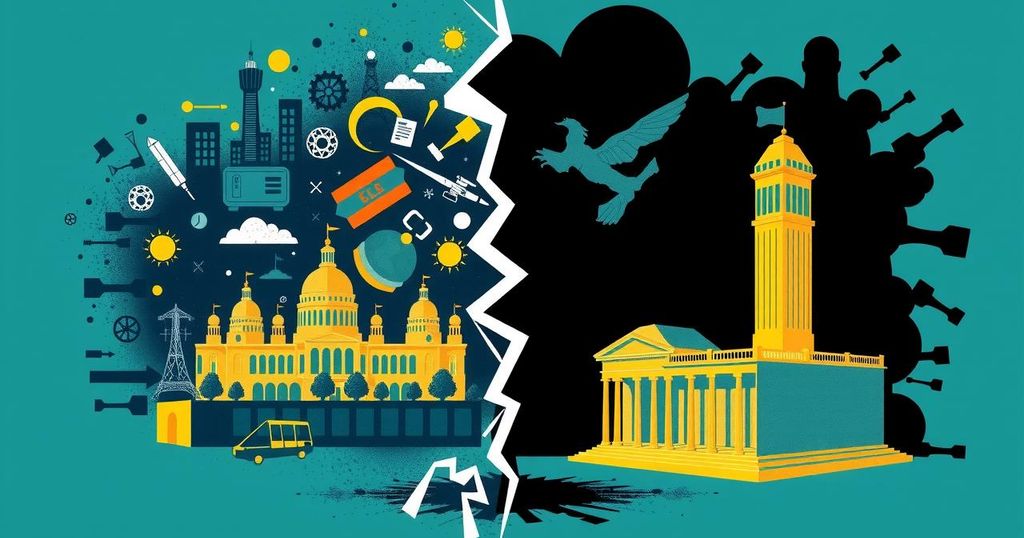Hezbollah Must Be Held Accountable Under Lebanese Law
Lebanon is grappling with deep-seated issues related to corruption and the powerful influence of Hezbollah. Recent banking reforms aim to restore international trust but may fall short without addressing Hezbollah’s financial empire. The group operates independently, complicating Lebanon’s political and economic landscape. Genuine reform must confront Hezbollah’s parallel structures, posing significant challenges in governance and societal control. All efforts must prioritize the rule of law for true recovery and sovereignty in Lebanon.
Lebanon, once hailed as the “Switzerland of the Middle East,” is now grappling with significant challenges as corruption and foreign influences erode traditional institutions. Although recent reforms, such as the dismantling of certain banking secrecy protections, signal potential progress, these measures may remain largely ineffective unless Lebanon’s leaders confront the formidable presence of Hezbollah. The reality is that the group’s parallel financial system poses the most substantial barrier to real reform in the country.
In late April, Lebanese parliamentarians enacted a crucial reform enabling various regulatory authorities, including the central bank, to access bank account information. This step is aimed at unlocking a much-anticipated $3 billion financial aid package from the International Monetary Fund (IMF). The new regulation permits retrospective audits of customer accounts spanning ten years, enhancing transparency in Lebanon’s financial dealings and seeking to restore trust on an international scale.
However, the banking crisis that erupted in 2019 exposed severe structural issues within the financial system. It led to banks unilaterally freezing depositors’ funds and instituted a disjointed “fresh dollars” system. This system, which treated cash inflows differently based on their origin and timing, contributed to a flourishing shadow economy, significantly benefitting none other than Hezbollah.
A pivotal question now looms: Will authorities extend their newly enhanced auditing powers to scrutinize Hezbollah’s financial operations? Or are political paralysis and fear of retaliation likely to shield the group’s financial dealings from the necessary oversight? Hezbollah’s activities are not simply peripheral; they are closely tied to the roots of Lebanon’s ongoing crises, as the group effectively operates its economy through its own banks and social services network, largely beyond any state regulation.
The Al-Qard Al-Hasan Association, often claimed to be a charitable organization, primarily serves as one of Hezbollah’s financial pillars. It operates loans and microfinancing for supporters while remaining outside the central bank’s regulatory framework, despite prior U.S. sanctions. Hezbollah’s financial reach does not stop at Lebanon’s borders; it engages in various illicit enterprises ranging from drug trafficking to money laundering, which supports its operations through billons funneled from global criminal activities.
Particularly vital is Hezbollah’s financial reliance on Iranian support, which enables it to maintain a dual market of legitimate and contraband goods inside Lebanon. This situation severely undermines legitimate businesses operating under official laws, yet these informal markets fortify Hezbollah’s dominance over economic and societal structures.
For real reform to take hold, Lebanese authorities need to address Hezbollah’s parallel economy directly. Without harnessing a true commitment to the rule of law encompassing all financial transactions, any regulatory achievements could turn out to be mere superficial gestures.
Sadly, optimism remains scant. Hezbollah’s longstanding presence is both a product and a protector of Lebanon’s post-civil war architecture, often yielding to its demands for political influence. Many fear that challenging Hezbollah could trigger renewed civil strife; thus, political inertia continues.
Inaction risks catastrophic consequences for Lebanon, already teetering on the brink of economic and political failure. Allowing the group to maintain a parallel financial system reiterates cycles of corruption, further destabilizing the nation and undermining potential recovery efforts. If Hezbollah operates unchecked, those advocating for genuine financial reform are bound to fail.
Moreover, Hezbollah’s social services—encompassing schools and healthcare—are not solely benevolent; they also serve as tools for loyalty and control within communities abandoned by the state. Until these social mechanisms are integrated into the Lebanese framework, national unity will remain elusive.
Realistically, tackling these issues is daunting, not least because it could ignite conflict with a heavily armed Hezbollah, supported by Iran. Some may argue that Hezbollah’s existence is integral to Lebanon’s security against external threats, particularly from Israel. However, Lebanon’s most pressing danger is not external but rather its own disintegration from within.
While Lebanon’s new leadership displays promising actions through recent reforms, a significant challenge lies ahead. Sovereignty cannot be fragmentary; a nation cannot hope to mend its financial systems while ignoring the militia’s extensive economic enterprises. Genuine international support requires a commitment to confronting networks that fuel criminality.
This transformational journey must arise from within Lebanon itself. Change driven exclusively by external influences like the IMF lacks sustainability. It is crucial for Lebanese leaders to demonstrate resilience, not due to international demands but from an understanding of the nation’s dire situation. Enforcing the rule of law uniformly—applying it to politicians, banks, and Hezbollah alike—is essential for Lebanon’s future recovery and stability.
The path to recovery will be exceptionally challenging; entrenched interests and a paralyzing culture of fear will be significant hurdles. Yet, every initiative taken to restore authority over financial systems, militia activities, and informal markets represents a vital step toward rejuvenating a country that has been perilously close to collapse for far too long.
If Lebanon does not take decisive action now, the country risks losing any remaining semblance of sovereignty, spiraling into chaos that could prove irreversible. It is evident that Hezbollah’s impunity must come to an end for Lebanon to initiate a meaningful healing process.
In conclusion, Lebanon stands at a critical juncture where confronting Hezbollah’s extensive financial network is pivotal for any genuine reform. While recent legislative changes indicate potential progress, these efforts will falter unless they wholly encompass all sectors, including those dominated by Hezbollah. The road ahead is undeniably arduous, fraught with resistance, yet vital for Lebanon’s future. Pursuing the rule of law equally across all actors is crucial for restoring stability and sovereignty in Lebanon.
Original Source: weeklyblitz.net




Post Comment